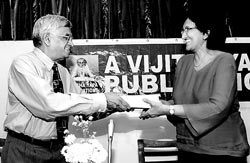
Vivid vignettes of everyday lifeShort and Verse by M. T. L. Ebell. Published by Vijitha Yapa. Rs.199. Reviewed by Anne Abayasekara. Facets of daily life often receive no particular attention, occupied as most of us are with the hurry and scurry and general `busyness’ of juggling with careers and coping with the cost of living. However, every now and then a perceptive writer who reflects on ordinary happenings of the kind with which we are familiar, takes a fresh look and uses them to create stories that make us stop and think again. This is what M. T. L. Ebell has done through the short stories which she has put together along with a few poems, in a slim volume entitled “Short and Verse”.
Although this is her first book, Ms. Ebell has been a regular contributor to national newspapers and magazines and one of the stories included here, “Shadows”, won the first prize in a competition organised a few years ago by the English Writers Cooperative of Sri Lanka. This particular story paints, with an admirable economy of words, a vignette of the reversed status that a relationship between a mother and her child undergoes when a parent ages and it’s the once-upon-a-time child who now acts as guardian of his former primary caregiver. In the story called “Interviews”, the tensions, frustrations and anxiety experienced by parents trying to get their 5-year-old mite into a “good” school, are depicted with an insight to which many parents will spontaneously respond. “Mine- sweeper” brings the war close in the convincing picture Ebell draws of two friends who, from boyhood when they would spend hours playing a computer game which dealt with clicking the mouse to uncover hidden minesweepers, have, as young adults, inevitably joined the army and became expert minesweepers. A story I particularly liked is called “The Sword” and tells of a girl and her much-loved grandmother, for both of whom the English language comes naturally to their lips. The young one finds it a struggle to study in the Sinhala medium in school because of her English-speaking home background. The old lady is taken by surprise when the girl tells her one day that “The people, the real people of this country, don’t like people who speak English the way we do.” No, Nanna had been quite unaware of it, remembering vividly the day her own mother had her admitted to a convent school where she, Gracie Ratnayake, would be taught good English which would give her an edge over those less privileged. “But an edge can cut and now it was hurting her grand-daughter.” Her mother had spoken of an English education as “a sword of liberation.” The girl looked back at her Nanna as she prepared to leave the room and said: “You know, Nanna, they say `kaduva danava’ whenever we speak in English. They say we use it to dominate them.” The last line of the story is that “Gracie (Nanna) pondered on the two words ‘they’ and ‘we’.” Ms. Ebell has a sense of humour, too, for she takes the reader for a ride in stories like “First Love” and “Threesome” in which she seems deliberately to mislead us as to the real identity of her characters, so that she can make us laugh with her at the unexpected revelation at the very end of each story. Although she again takes us by surprise in “Peeping Tom”, this is a serious story well told and we should not really be astonished by its unexpected conclusion, for it is very true to life. The poems have an arresting quality of their own and two of them relate to the destruction of the twin towers of the World Trade Center in New York in the 9/11 attack. Here again, the angle from which she views the downfall of the towers, described in short, terse words, is most unusual. “Child Soldier” fully evokes the pathos of a boy’s brief and bloody spell as a conscripted soldier. Ms. Ebell’s creative touch changes the way we regard matters to which we might not normally attach much significance. That is the gift of a sensitive and imaginative writer who sees things from a different perspective to that of the heedless humans who hurry by. It is to be hoped that she will continue to pen more stories to entertain and inform us.
|
|| Front
Page | News | Editorial | Columns | Sports | Plus | Financial
Times | International | Mirror | TV
Times | Funday
Times || |
| |
Copyright
2007 Wijeya
Newspapers Ltd.Colombo. Sri Lanka. |

